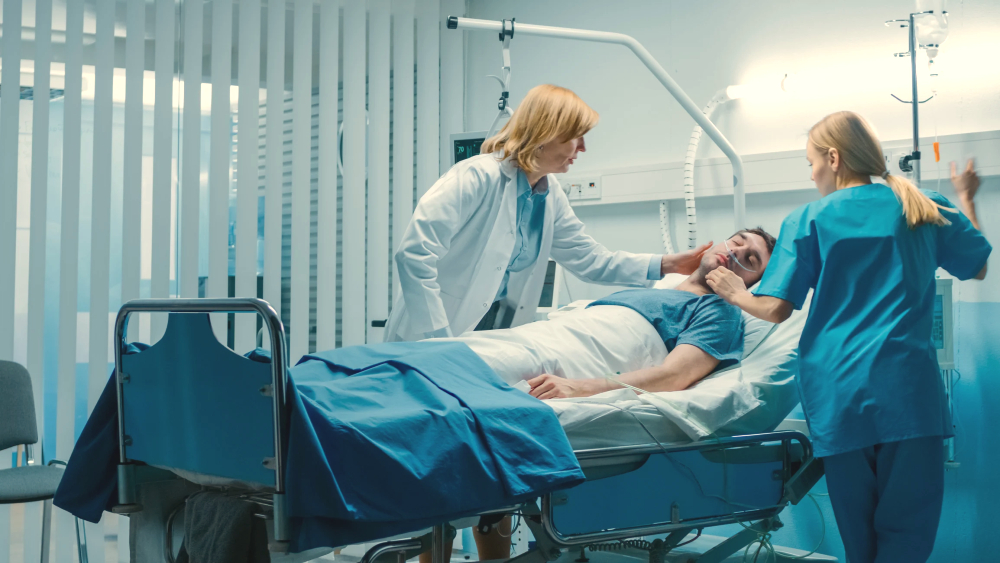Delirij je potencialno reverzibilno bolezensko stanje, ki se navadno začne nenadoma; oseba se ni zmožna osredotočiti in postane zmedena, dezorientirana ter ne more jasno misliti.
DELIRIJ: Splošno | Simptomi | Vzroki | Diagnoza | Zdravljenje | Delirij ali psihoza | Delirij ali demenca | Demenca | Vprašanja in odgovori | Viri/reference
Čeprav delirij in demenco v medicinskih knjigah pogosto obravnavamo skupaj, sta dejansko zelo različna. Delirij pomeni nenadno, navadno reverzibilno (povratno) spremembo duševnega stanja, za katero sta značilni zmedenost in dezorientiranost. Demenca je kronična, počasi napredujoča bolezen, katere posledica je izguba spomina in hud propad vseh vidikov delovanja duševnosti; v nasprotju z delirijem je demenca navadno nepopravljiva.
Simptomi
Delirij se lahko začne na več načinov in primer je včasih težko prepoznati. Vedenje ljudi je različno, v grobem pa je podobno vedenju človeka, ki postaja čedalje bolj piian. Najpomembnejši znak delirija je nezmožst biti na nekaj pozoren. Delirantni ljudje se ne morejo osredotočiti, tako da s težavo predelujejo nove informacije in se ne morejo spomniti nedavnih dogodkov.
Skoraj vsi so dezorientirani v času in vsaj deloma zmedeni glede tega, kje so. Mislijo zmedeno, besedičijo ali celo mislijo nepovezano. V težkih primerih bolnik včasih ne ve, kdo je. Take bolnike lahko strašijo bizarne halucinacije, v katerih vidijo reči ali ljudi, ki jih ni.
Slika: Zdravljenje delirija je odvisno od temeljnega vzroka.

Nekateri postanejo paranoični in verjamejo, da se dogajajo čudne stvari (blodnje). Delirantni ljudje se na svoje težave odzivajo različno: nekateri postanejo tako tihi in zaprti vase, da tisti okrog njih včasih sploh ne ugotovijo, da so delirantni; drugi postanejo agitirani in se poskušajo s svojimi prividi ali blodnjami boriti.
Video vsebina: Delirij - vzroki, simptomi, diagnoza, zdravljenje in patologija.

Kadar delirij povzročajo zdravila ali mamila, se vedenje pogosto spremeni na različne načine, odvisno od snovi. Tako npr. ljudje, zastrupljeni z uspavalnimi tabletami, pogosto postanejo zelo zaprti vase, tisti, ki se zastrupijo z amfetamini, pa lahko postanejo agresivni in hiperaktivni.
Delirij lahko traja več ur, dni ali celo dlje, odvisno od tega, kako težek je, ter od bolnikovega siceršnjega zdravstvenega stanja. Pogosto se poslabša ponoči (to imenujemo pojav zahajajočega sonca). Prej ali slej bo delirantni bolnik utonil v nemirno spanje; včasih delirij lahko napreduje celo v komo.
Vzroki
Delirij je nenormalno duševno stanje (ne bolezen) s številnimi simptomi, ki kažejo zmanjšano duševno delovanje. Delirij lahko povzroči stotine bolezenskih stanj, ki segajo od preproste dehidracije do zastrupitev z zdravili ali smrtno nevarnih okužb.
Pogosti vzroki delirija:
- Alkohol, mamila in strupi.
- Toksični učinki zdravil.
- Nenormalne krvne koncentracije elektrolitov, soli in mineralov, npr. kalcija, natrija ali magnezija, ki so posledica jemanja zdravil, dehidracije ali bolezni.
- Akutna okužba z vročino.
- Hidrocefalus z normalnim pritiskom -bolezensko stanje, pri katerem se cerebrospinalna tekočina, ki oblazinja možgane, ne reabsorbira dovolj hitro, in zato pritiska na možgane.
- Subduralni hematom - skupek krvi pod lobanjo, ki lahko pritiska na možgane.
- Meningitis, encefalitis, sifilis - okužbe, ki prizadenejo možgane.
- Pomanjkanje tiamina in vitamina B12.
- Bolezni ščitnice, bodisi zaradi premalo aktivne bodisi zaradi preveč aktivne ščitnice.
- Možganski tumorji - nekateri včasih povzročajo zmedenost in težave s spominom.
- Zlomi kolka in dolgih kosti.
- Oslabljeno delovanje srca ali pljuč, kar ima za posledico pomanjkanje kisika ali presežek ogljikovega dioksida v krvi.
- Možganska kap.
Najpogosteje delirij prizadene starejše in tiste, ki imajo možgane že od prej okvarjene, npr. zelo težke bolnike, tiste, ki jemljejo zdravila ali mamila, ki spreminjajo duševnost ali vedenje, in ljudi z demenco.
Diagnoza
Zdravniki zlahka prepoznajo delirij, ki je prešel blago fazo. Ker je lahko delirij znak številnih resnih bolezni, od katerih lahko nekatere hitro povzročijo smrt, poskušajo zdravniki čimprej ugotoviti vzrok zanj. Najprej skušajo razločiti delirij od duševne bolezni.
Slika: Zdravniki skušajo razločiti delirij od duševne bolezni.

Pri starejših ljudeh skušajo zdravniki razločiti delirij od demence, tako da ugotovijo, v kakšnem duševnem stanju je bil bolnik pred nastopom delirija. Vendar pa lahko postanejo delirantni tudi bolniki, ki imajo demenco.
Zdravljenje
Zdravljenje delirija je odvisno od temeljnega vzroka. Tako npr. zdravimo okužbe z antibiotiki, vročino z drugimi zdravili, nenormalno koncentracijo soli in mineralov v krvi pa z uravnavanjem tekočin in soli. Ljudem, ki so izredno agitirani ali ki imajo halucinacije, je treba preprečiti, da bi poškodovali same sebe ali svoje negovalce. V bolnišnicah včasih uporabljajo tapecirane ovirnice. Agitacijo lahko pomagajo olajšati benzodiazepinska zdravila, npr. diazepam, triazolam in temazepam.
Antipsihotična zdravila, npr. haloperidol, tioridazin in klorpromazin, navadno dajemo le ljudem, ki so agresivno paranoidni ali močno grozavi, ali tistim, ki jih ni mogoče pomiriti z benzodiazepini. Bolnišnice uporabljajo ovirnice le, če ni drugega izhoda, zdravniki pa so pazljivi pri predpisovanju zdravil, posebno pri starejših ljudeh, ker lahko ovirnice ali zdravila povzročijo še večjo agitacijo ali zmedenost in prikrijejo temeljni problem. Če pa je delirij sprožil alkohol, dajejo zdravniki benzodiazepine, dokler agitacija ne mine.
Je to delirij ali psihoza?
Delirij in spihozo sta dva različna stanja, ki vplivata na mentalno zdravje, vendar imata nekoliko različne značilnosti. Delirij je stanje zmedenosti in dezorientacije, ki ga pogosto spremljajo halucinacije, vznemirjenost in zmanjšana zavest o okolici. Običajno je povezan z akutnimi fizičnimi boleznimi, kot so okužbe, dehidracija ali stranski učinki zdravil.
Video vsebina: Delirij ali demenca?

Psihoza je stanje, ki ga zaznamuje izguba stika z resničnostjo. Oseba lahko doživlja halucinacije, blodnje, motnje razmišljanja in čustvovanja. To stanje je lahko povezano z različnimi duševnimi boleznimi, kot so shizofrenija, bipolarna motnja ali huda depresija.
| Pogosti znaki delirija (telesna bolezen) | Pogosti znaki psihoze (duševna bolezen) |
| Zmedenost glede trenutnega časa, datuma, kraja ali istovetnosti. | Bolnik se navadno zaveda časa, kraja in istovetnosti. |
| Težave pri ohranjanju pozornosti. | Zmožnost ohranjanja pozornosti. |
| Izguba svežega spomina. | Nelogično mišljenje, a ohranitev svežega spomina. |
| Nezmožnost logičnega mišljenja ali preprostega računanja. | Ohranjena zmožnost računanja. |
| Vročina ali drugi znaki okužbe. | Anamneza prejšnjih psihiatričnih motenj. |
| Zaposlitveni nemir je navadno spremenljiv. | Zaposlitveni nemir je pogosto stalen in nespremenljiv. |
| (Morebitne) halucinacije so navadno vidne. | (Morebitne) halucinacije so večinoma slušne. |
Čeprav sta delirij in psihoza oba povezana z motnjami v zaznavanju in razmišljanju, je njihova etiologija različna, prav tako pa se razlikujejo tudi pri zdravljenju. Delirij je običajno kratkotrajno stanje, ki izgine, ko se obravnava osnovni vzrok, medtem ko psihoza pogosto zahteva dolgoročno zdravljenje in upravljanje. Pomembno je, da se oba stanja obravnavata strokovno in da se zagotovi ustrezna medicinska pomoč.
Je to delirij ali demenca?
Delirij in demenca sta oba povezana z motnjami v kognitivnih funkcijah, vendar imata nekoliko različne značilnosti. Delirij je akutno stanje zmedenosti in dezorientacije, ki se običajno hitro razvije in je pogosto reverzibilen. Oseba s delirijem lahko doživlja halucinacije, motnje pozornosti, zmedenost, dezorientacijo in nihanje razpoloženja. Pogosto je povezan z akutnimi fizičnimi boleznimi, kot so okužbe, poškodbe, dehidracija ali stranski učinki zdravil.
Demenca je kronično progresivno stanje, ki vključuje izgubo kognitivnih sposobnosti, vključno z izgubo spomina, sposobnosti razmišljanja, orientacije, jezika, presoje in sposobnosti opravljanja vsakodnevnih dejavnosti. Pogosto je povezana s starostjo in boleznimi, kot je Alzheimerjeva bolezen, vaskularna demenca, Lewyjevi telesci ali frontotemporalna demenca.
Primerjava delirija in demence:
| Delirij | Demenca |
| Razvije se nenadoma. | Razvija se počasi. |
| Traja več dni do več tednov. | Lahko je trajna. |
| Povezan je z uživanjem ali odtegnitvijo zdravil oz mamil, s težko boleznijo, presnovnimi težavami. | Bolnik je lahko sicer zdrav. |
| Skoraj vedno je slabši ponoči. | Pogosto je slabša ponoči. |
| Bolnik ne more osredotočiti pozornosti. | Pozornost bega. |
| Zavest niha od letargije do agitacije. | Zavest je pogosto zmanjšana, ne kaže pa velikih nihanj. |
| Orientacija v okolju je različna. | Orientacija v okolju je motena. |
| Govor je počasen, pogosto nekoherenten in neustrezen. | Bolnik ima včasih težave pri iskanju prave besede. |
| Spomin je neurejen, zmeden. | Izguba spomina, posebno za nedavne dogodke. |
Ključna razlika med delirijem in demenco je v njuni naravi, trajanju in vzrokih. Delirij je običajno akuten in reverzibilen, medtem ko je demenca kronična in progresivna. Poleg tega je delirij pogosto povezan z akutnimi fizičnimi boleznimi, medtem ko je demenca pogosto posledica degenerativnih ali vaskularnih bolezni možganov. Obe stanji zahtevata ustrezno medicinsko obravnavo in upravljanje.
Demenca
Demenca je zmanjšanje duševnih zmožnosti ki navadno napreduje počasi in pri katerem lahko pride do okvar spomina, mišljenja, presoje in zmožnosti usmerjanja pozornosti in učenja ter do propadanja osebnosti.
Slika: Demenca je veliko resnejše zmanjšanje duševnih sposobnosti.
.jpg)
Demenca se lahko razvije nenadoma pri mladih ljudeh, kadar huda poškodba, bolezen ali strup (npr. ogljikov monoksid) uniči možganske celice. Vendar se navadno razvija počasi pri ljudeh, starejših od 60 let. Kljub temu demenca ni normalen del staranja. Staranje pri vseh ljudeh povzroča v možganih spremembe, zaradi katerih ljudje nekoliko izgubijo spomin - posebno kratkoročni spomin - in se niso zmožni več hitro učiti.
Te normalne spremembe ne vplivajo na zmožnosti normalnega delovanja. Pozabljivost se pri starejših ljudeh včasih imenuje benigna starostna pozabljivost in ni nujno znak demence ali zgodnje Alzheimerjeve bolezni. Demenca je veliko resnejše zmanjšanje duševnih sposobnosti, ki se sčasoma slabša. Medtem ko ljudje, ki se starajo, utegnejo normalno pozabiti kake podrobnosti, lahko ljudje z demenco pozabijo nedavne dogodke v celoti.
Vzroki
Najpogostejši vzrok demence je Alzheimerjeva bolezen. Ne vemo, kaj povzroča Alzheimerjevo bolezen, vendar so pri tem pomembni dednostni dejavniki - zdi se, da se bolezen pojavlja v nekaterih rodbinah in da jo povzroča ali nanjo vpliva več točno določenih genskih nenormalnosti.
Pri Alzheimerjevi bolezni deli možganov degenerirajo, celice odmrejo, odzivnost preostalih celic na številne kemijske snovi, ki prenašajo signale v možganih, pa se zmanjša. Nenormalna tkiva, ki se imenujejo senilni plaki in nevrofibrilarni vozliči, in nenormalne beljakovine se pojavijo v možganih ter jih zdravniki prepoznajo pri obdukciji.
Drugi najpogostejši vzrok demence so zaporedne možganske kapi. Posamezne kapi so majhne, tako da za njimi ne ostane veliko neposredne ohromelosti (ali pa sploh nič) in le redko takšna vrsta paralize, ki je posledica večjih kapi.
Vprašanja in odgovori
Ali je delirij lahko nevaren?
Delirij je lahko resen in je povezan s hudo boleznijo in fizičnim stresom. Obvladovanje osnovnega vzroka lahko pomaga odpraviti delirij[1].
Ali je delirij enako kot psihoza?
Delirij in spihozo sta dva različna stanja, ki vplivata na mentalno zdravje, vendar imata nekoliko različne značilnosti. Delirij je stanje zmedenosti in dezorientacije, ki ga pogosto spremljajo halucinacije, vznemirjenost in zmanjšana zavest o okolici. Običajno je povezan z akutnimi fizičnimi boleznimi, kot so okužbe, dehidracija ali stranski učinki zdravil.
Slika: Psihoza je stanje, ki ga zaznamuje izguba stika z resničnostjo.
.jpg)
Psihoza je stanje, ki ga zaznamuje izguba stika z resničnostjo. Oseba lahko doživlja halucinacije, blodnje, motnje razmišljanja in čustvovanja. To stanje je lahko povezano z različnimi duševnimi boleznimi, kot so shizofrenija, bipolarna motnja ali huda depresija.
Ali delirij lahko dobi vsak?
Delirij lahko sproži resna zdravstvena bolezen, kot je okužba, določena zdravila in drugi vzroki, kot je prenehanje jemanja drog ali zastrupitev. Starejši bolniki, starejši od 65 let, imajo največje tveganje za razvoj delirija. Ogroženi so tudi ljudje s predhodno možgansko boleznijo ali poškodbo možganov[2].
Ali je delirij ozdravljiv?
Zdravniki postavijo diagnozo na podlagi simptomov in rezultatov fizičnega pregleda ter uporabijo preiskave krvi, urina in slikovne preiskave, da ugotovijo vzrok. Takojšnje odpravljanje ali zdravljenje stanja, ki povzroča delirij, ga običajno pozdravi[3].
Ali se prizadeta oseba zaveda, da ima delirij?
Oseba z delirijem se morda ne zaveda sprememb in jih pogosto ne zna opisati[4].
Viri in reference
Veliki zdravstveni priročnik za domačo uporabo, Založba mladinska knjiga
- Delirium - https://www.hopkinsmedicine.org/
- Patient education: Delirium (Beyond the Basics) - https://www.uptodate.com/
- Delirium - https://www.msdmanuals.com/
- Delirium - https://my.clevelandclinic.org/






 Facebook
Facebook
 Instagram
Instagram
 info@moja-lekarna.com
info@moja-lekarna.com

